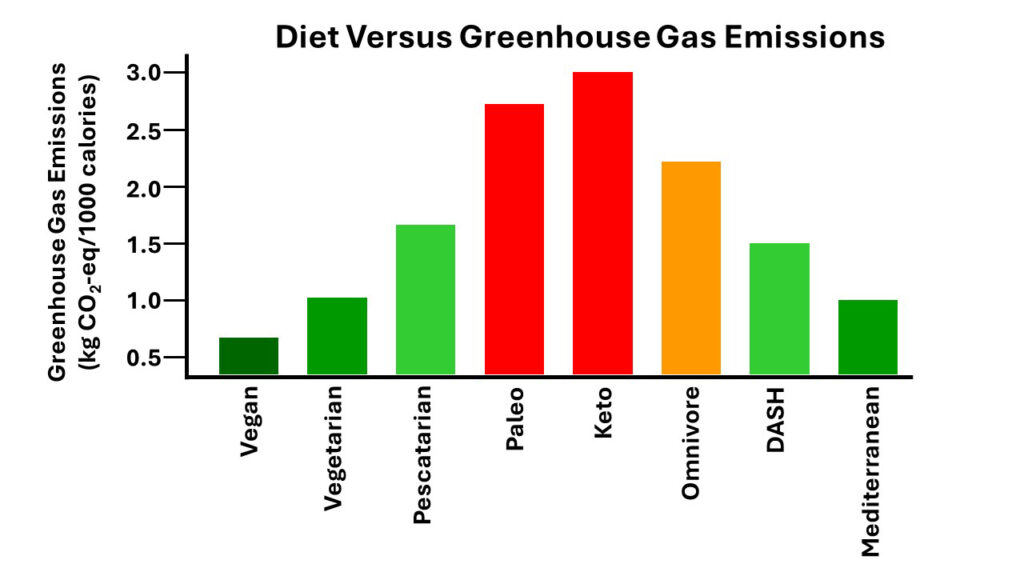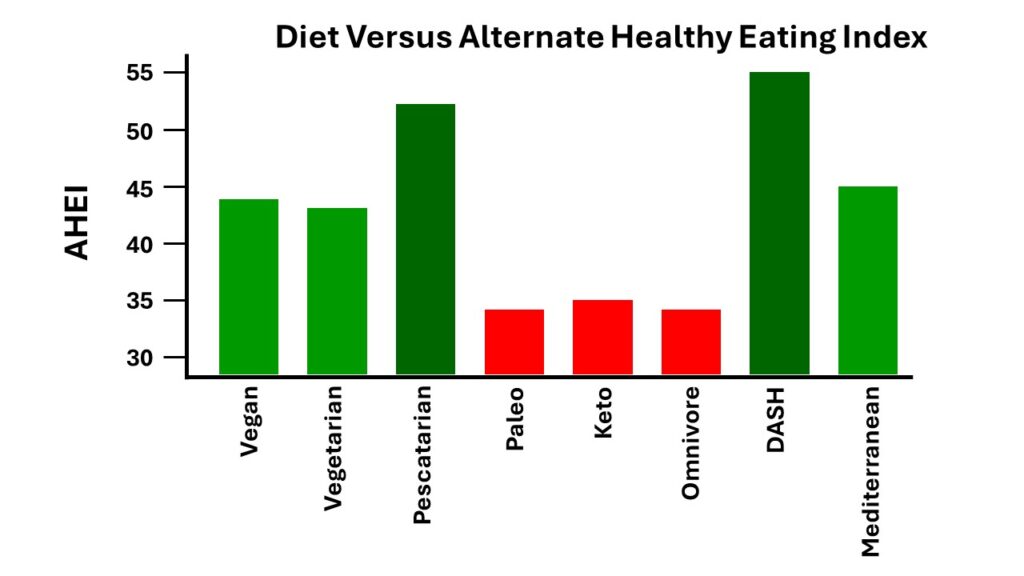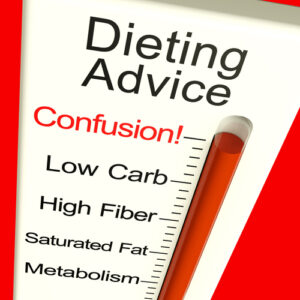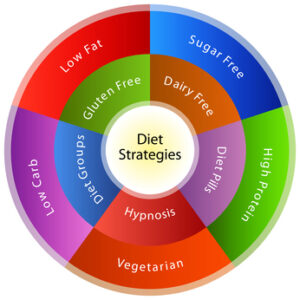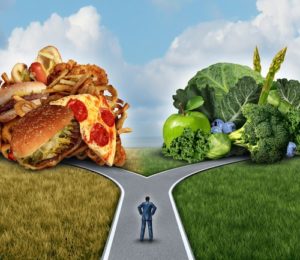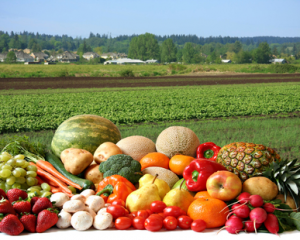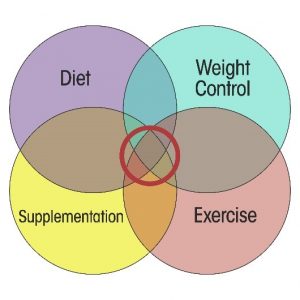Why Are Plant-Based Diets Healthy?
Author: Dr. Stephen Chaney
 Unless you are like Rip van Winkle and have been asleep for the past 30 years, you have probably heard that plant-based diets are good for you. In fact, that advice is sound. It is based on multiple long-term studies.
Unless you are like Rip van Winkle and have been asleep for the past 30 years, you have probably heard that plant-based diets are good for you. In fact, that advice is sound. It is based on multiple long-term studies.
But you may still be hesitant to make the switch. You are probably wondering if you have to be a vegan purist to benefit from a plant-based diet. If so, you are wondering whether you can make that drastic a change in your diet. Or, you may have already decided “that is a bridge too far” and don’t want to even consider it.
So, one important question is, “Do you have to go vegan to benefit from a plant-based diet?”
On the other hand, “Big Food, Inc” has made it easier than ever to switch to more “plant-based” eating. After all, sugar comes from plants. And highly processed grains come from plants. Add a few chemicals and you can come up with an endless supply of highly processed plant-based foods.
So, another important question is, “Can a diet of highly processed plant-based foods be as healthy as a diet of whole, unprocessed plant-foods?”
The study (Y. Wang et al., Nutrition Journal, 22: 46, 2023) I am reviewing today was designed to answer these two questions. It also represents the first meta-analysis to combine data from studies on the effects of plant-based diets on diabetes, heart disease, cancer, and mortality into a single study.
How Was The Study Done?
 The investigators performed a meta-analysis of 76 studies with 2,230,443 participants that looked at the associations of plant-based dietary patterns and the incidence of type 2 diabetes, cardiovascular disease, cancer, and mortality among adults 18 years or older.
The investigators performed a meta-analysis of 76 studies with 2,230,443 participants that looked at the associations of plant-based dietary patterns and the incidence of type 2 diabetes, cardiovascular disease, cancer, and mortality among adults 18 years or older.
The characteristics of study participants ranged from:
- 25 to 87 years old.
- BMI of 20 to 30.
And the duration of the studies within the meta-analysis ranged from 2 to 36 years.
The adherence to plant-based diets was defined as higher consumption of plant-based foods and lower consumption or exclusion of animal-based foods.
The meta-analysis also included studies looking at the effect of changing from a more animal-based to a more plant-based dietary pattern.
The meta-analysis included studies looking at the benefit of vegan and vegetarian diets. In terms of participants these studies represented just over 50% of the data in the meta-analysis. So, this meta-analysis was ideally positioned to determine whether vegan and vegetarian diets were more beneficial than other primarily plant-based dietary patterns that included some animal foods.
The methodology used to classify diets as primarily plant-based varied from study to study. But in each case the study participants were divided into quartiles ranging from consuming the most plant-based diet to consuming the least plant-based diet.
The study then compared study participants with the highest adherence to plant-based diets to those with the lowest adherence to plant-based diets with respect to type 2 diabetes, cardiovascular disease, cancer, and mortality.
Finally, the study also compared adherence to healthy plant-based dietary patterns (whole or minimally processed fruits, vegetables, whole grains, beans, nuts, and seeds) to unhealthy plant-based dietary patterns (foods and drinks with added sugar, highly processed plant foods, and starchy vegetables).
Are Plant-Based Diets Healthy?
 When comparing highest to lowest adherence to plant-based dietary patterns the risk of:
When comparing highest to lowest adherence to plant-based dietary patterns the risk of:
- Type-2 diabetes was reduced by 18%.
- Cardiovascular disease was reduced by 10%.
- Cancer was reduced by 12%.
- Mortality was reduced by 16%.
In short, all the news was good for primarily plant-based dietary patterns.
Are All Plant-Based Diets Healthy?
 Increased adherence to a healthy plant-based dietary pattern (That term is defined in the methods section above) was associated with an even better reduction in disease risk. For example:
Increased adherence to a healthy plant-based dietary pattern (That term is defined in the methods section above) was associated with an even better reduction in disease risk. For example:
- Type-2 diabetes was reduced by 21%.
- Cardiovascular disease was reduced by 15%.
- Cancer was reduced by 13%.
- Mortality was reduced by 14%, which was statistically indistinguishable from the reduction in mortality associated with all plant-based dietary patterns above.
 In contrast, increased adherence to an unhealthy plant-based dietary pattern was associated with increased risks of disease. For example:
In contrast, increased adherence to an unhealthy plant-based dietary pattern was associated with increased risks of disease. For example:
- The risk of type 2 diabetes increased by 8%.
- The risk of cardiovascular disease increased by 14%.
- The risk of cancer increased by 7%.
- The risk of mortality increased by 16%.
In short, plant-based dietary patterns consisting of whole or minimally processed plant foods are good for you. Plant-based dietary patterns consisting of highly processed plant foods are not.
Are Vegan and Vegetarian Diets More Beneficial Than Other Plant-Based Dietary Patterns?
 Twenty seven of the studies within this meta-analysis compared vegetarian or vegan dietary patterns with animal-based dietary patterns. These studies had 1,343,967 participants, which amounts to 57% of the participants in the meta-analysis.
Twenty seven of the studies within this meta-analysis compared vegetarian or vegan dietary patterns with animal-based dietary patterns. These studies had 1,343,967 participants, which amounts to 57% of the participants in the meta-analysis.
Thus, this meta-analysis was well positioned to determine relative benefits of vegan and vegetarian diets compared to other primarily plant-based dietary patterns that include some animal foods. The investigators reported that:
- The risk reduction for type 2 diabetes was greater in studies with vegan and vegetarian diets than in studies with other primarily plant-based diets.
- No other statistically significant benefits were observed for vegan and vegetarian diets compared to other primarily plant-based diets.
In short, you don’t need to become a vegan to experience the health benefits of a plant-based diet.
In contrast, increased adherence to an unhealthy plant-based dietary pattern was associated with increased risks of disease. For example:
- The risk of type 2 diabetes increased by 8%.
- The risk of cardiovascular disease increased by 14%.
- The risk of cancer increased by 7%.
- The risk of mortality increased by 16%.
In short, plant-based dietary patterns consisting of whole or minimally processed plant foods are good for you. Plant-based dietary patterns consisting of highly processed plant foods are not.
What If You Change From An Animal-Based To A Plant-Based Diet?
 If you have been consuming an animal-based diet for years, you may be wondering whether it is too late to change. Has the damage already been done?
If you have been consuming an animal-based diet for years, you may be wondering whether it is too late to change. Has the damage already been done?
Six studies within this meta-analysis examined the effect of changing from an animal-based diet to a plant-based diet on type 2 diabetes and mortality. Changing to a more plant-based dietary pattern:
- Reduced diabetes by 17% and mortality by 5%.
In short, it’s never too late to switch to a more plant-based dietary pattern.
Why Are Plant-Based Diets Healthy?
 The short answer is that we don’t know for sure, but the authors mentioned several popular hypotheses.
The short answer is that we don’t know for sure, but the authors mentioned several popular hypotheses.
- Obesity is a risk factor for type 2 diabetes, cardiovascular disease, and certain types of cancer. And studies have shown that people consuming plant-based diets tend to weigh less.
- The increased fiber content and higher ratio of polyunsaturated fats to saturated fats lower cholesterol levels and improve blood lipid profiles, which are associated with a lower risk of cardiovascular disease.
- Plant-based diets are anti-inflammatory, which reduces the risk of all three diseases.
- Plant foods are rich in polyphenols and other phytonutrients that are associated with reduced risk of cardiovascular disease, lower blood pressure, and improvements in insulin sensitivity.
- Plant foods are metabolized by gut bacteria to metabolites that are associated with reduced risk of type 2 diabetes and cardiovascular disease.
- Plant foods support healthy gut bacteria associated with a reduced risk of several diseases.
- Finally, plant-based dietary patterns are associated with no or reduced consumption of red and processed meats, which increase the risk of type 2 diabetes, cardiovascular disease, and certain types of cancer.
For a more detailed discussion read the article).
What Does This Study Mean For You?
 The authors of this study concluded, “Higher adherence to plant-based dietary patterns, especially from healthy sources, may be universally beneficial for the primary prevention of type 2 diabetes, cardiovascular disease, cancer, and mortality. The current study provides further evidence in support of current recommendations that emphasize consuming high-quality plant-based foods for achieving optimal health.”
The authors of this study concluded, “Higher adherence to plant-based dietary patterns, especially from healthy sources, may be universally beneficial for the primary prevention of type 2 diabetes, cardiovascular disease, cancer, and mortality. The current study provides further evidence in support of current recommendations that emphasize consuming high-quality plant-based foods for achieving optimal health.”
“Future studies are needed to elucidate…mechanistic pathways linking plant-based diets with multiple disease outcomes.”
I would just like to emphasize a few points:
- These are all association studies. It takes decades for diseases like diabetes, heart disease, and cancer to develop. So, it is impossible to confirm these findings with double blind, placebo-controlled studies. However, when you have 76 studies with over 2 million participants all pointing to the same conclusion, it is hard to ignore the findings.
- The good news is that you don’t have to become a vegan to experience these benefits. There are many healthy primarily plant-based diets available. Choose the one that best fits your food preferences and lifestyle.
- Be aware that whatever diet you choose, Big Food Inc is only too happy to provide you with highly processed foods that fit that dietary pattern. Don’t fall for that trap. Stick with whole or minimally processed plant foods.
- If your current diet isn’t the best, it is never too late to switch to a healthier primarily plant-based diet.
The Bottom Line
A recent meta-analysis of 76 studies with 2,230,443 participants looked at the associations of plant-based dietary patterns and the incidence of type 2 diabetes, cardiovascular disease, cancer, and mortality among adults 18 years or older.
The authors of the study concluded, “Higher adherence to plant-based dietary patterns, especially from healthy sources, may be universally beneficial for the primary prevention of type 2 diabetes, cardiovascular disease, cancer, and mortality. The current study provides further evidence in support of current recommendations that emphasize consuminh high-quality plant-based foods for achieving optimal health.”
Other key points from the study are:
- These are all association studies. It takes decades for diseases like diabetes, heart disease, and cancer to develop. So, it is impossible to confirm these findings with double blind, placebo-controlled studies. However, when you have 76 studies with over 2 million participants all pointing to the same conclusion, it is hard to ignore the findings.
- The good news is that you don’t have to become a vegan to experience these benefits. There are many healthy primarily plant-based diets available. Choose the one that best fits your food preferences and lifestyle.
- Be aware that whatever diet you choose, Big Food Inc is only too happy to provide you with highly processed foods that fit that dietary pattern. Don’t fall for that trap. Stick with whole or minimally processed plant foods.
- If your current diet isn’t the best, it is never too late to switch to a healthier primarily plant-based diet.
For more details about how the authors came to these conclusions and what they mean for you, read the article above.
These statements have not been evaluated by the Food and Drug Administration. This information is not intended to diagnose, treat, cure, or prevent any disease.
_______________________________________________________________________________
My posts and “Health Tips From the Professor” articles carefully avoid claims about any brand of supplement or manufacturer of supplements. However, I am often asked by representatives of supplement companies if they can share them with their customers.
My answer is, “Yes, as long as you share only the article without any additions or alterations. In particular, you should avoid adding any mention of your company or your company’s products. If you were to do that, you could be making what the FTC and FDA consider a “misleading health claim” that could result in legal action against you and the company you represent.
For more detail about FTC regulations for health claims, see this link.
https://www.ftc.gov/business-guidance/resources/health-products-compliance-guidance
______________________________________________________________________
About The Author
 Dr. Chaney has a BS in Chemistry from Duke University and a PhD in Biochemistry from UCLA. He is Professor Emeritus from the University of North Carolina where he taught biochemistry and nutrition to medical and dental students for 40 years. Dr. Chaney won numerous teaching awards at UNC, including the Academy of Educators “Excellence in Teaching Lifetime Achievement Award”. Dr Chaney also ran an active cancer research program at UNC and published over 100 scientific articles and reviews in peer-reviewed scientific journals. In addition, he authored two chapters on nutrition in one of the leading biochemistry text books for medical students.
Dr. Chaney has a BS in Chemistry from Duke University and a PhD in Biochemistry from UCLA. He is Professor Emeritus from the University of North Carolina where he taught biochemistry and nutrition to medical and dental students for 40 years. Dr. Chaney won numerous teaching awards at UNC, including the Academy of Educators “Excellence in Teaching Lifetime Achievement Award”. Dr Chaney also ran an active cancer research program at UNC and published over 100 scientific articles and reviews in peer-reviewed scientific journals. In addition, he authored two chapters on nutrition in one of the leading biochemistry text books for medical students.
Since retiring from the University of North Carolina, he has been writing a weekly health blog called “Health Tips From the Professor”. He has also written two best-selling books, “Slaying the Food Myths” and “Slaying the Supplement Myths”. And most recently he has created an online lifestyle change course, “Create Your Personal Health Zone”. For more information visit https://chaneyhealth.com.
For the past 45 years Dr. Chaney and his wife Suzanne have been helping people improve their health holistically through a combination of good diet, exercise, weight control and appropriate supplementation.


